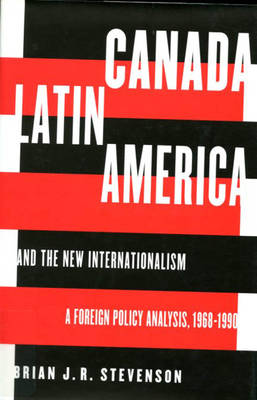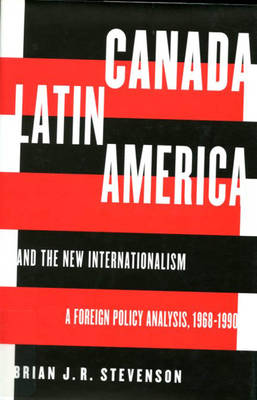
- Afhalen na 1 uur in een winkel met voorraad
- Gratis thuislevering in België vanaf € 30
- Ruim aanbod met 7 miljoen producten
- Afhalen na 1 uur in een winkel met voorraad
- Gratis thuislevering in België vanaf € 30
- Ruim aanbod met 7 miljoen producten
Zoeken
Canada, Latin America, and the New Internationalism
A Foreign Policy Analysis, 1968-1999 Volume 1
Brian J R Stevenson
€ 177,45
+ 354 punten
Omschrijving
In Canada, Latin America, and the New Internationalism Brian Stevenson argues that Canada's foreign policy toward Latin America has been profoundly affected by these three factors and has evolved in response to both changing domestic demands and shifting international circumstances. By analysing a pivotal period in Canada-Latin American relations, he shows us how successive Canadian governments made important initiatives toward closer relationships with Latin America and were also pressured by non-governmental organizations to play a bigger role in the region. Canada's increased role can be seen in official foreign policy commitments, such as the decision to join the Organization of American States, and in policy decisions on political refugees. He explains that while the United States has played a key role in sometimes constraining Canadian foreign policy in the region, it is important to realize that Canadian foreign policy has been steadied by a long-standing tradition of internationalism. Canada, Latin America, and the New Internationalism demonstrates that the tradition of internationalism in Canadian foreign policy as viewed from the perspective of foreign policy analysis provides the framework within which to understand and accommodate changes in its policy toward Latin America. The period which the book explores is critical in order to understand the contemporary nature and future direction of Canada-Latin America relations.
Specificaties
Betrokkenen
- Auteur(s):
- Uitgeverij:
Inhoud
- Aantal bladzijden:
- 320
- Taal:
- Engels
- Reeks:
- Reeksnummer:
- nr. 1
Eigenschappen
- Productcode (EAN):
- 9780773520325
- Verschijningsdatum:
- 6/12/2000
- Uitvoering:
- Hardcover
- Formaat:
- Genaaid
- Afmetingen:
- 158 mm x 237 mm
- Gewicht:
- 589 g

Alleen bij Standaard Boekhandel
+ 354 punten op je klantenkaart van Standaard Boekhandel
Beoordelingen
We publiceren alleen reviews die voldoen aan de voorwaarden voor reviews. Bekijk onze voorwaarden voor reviews.











